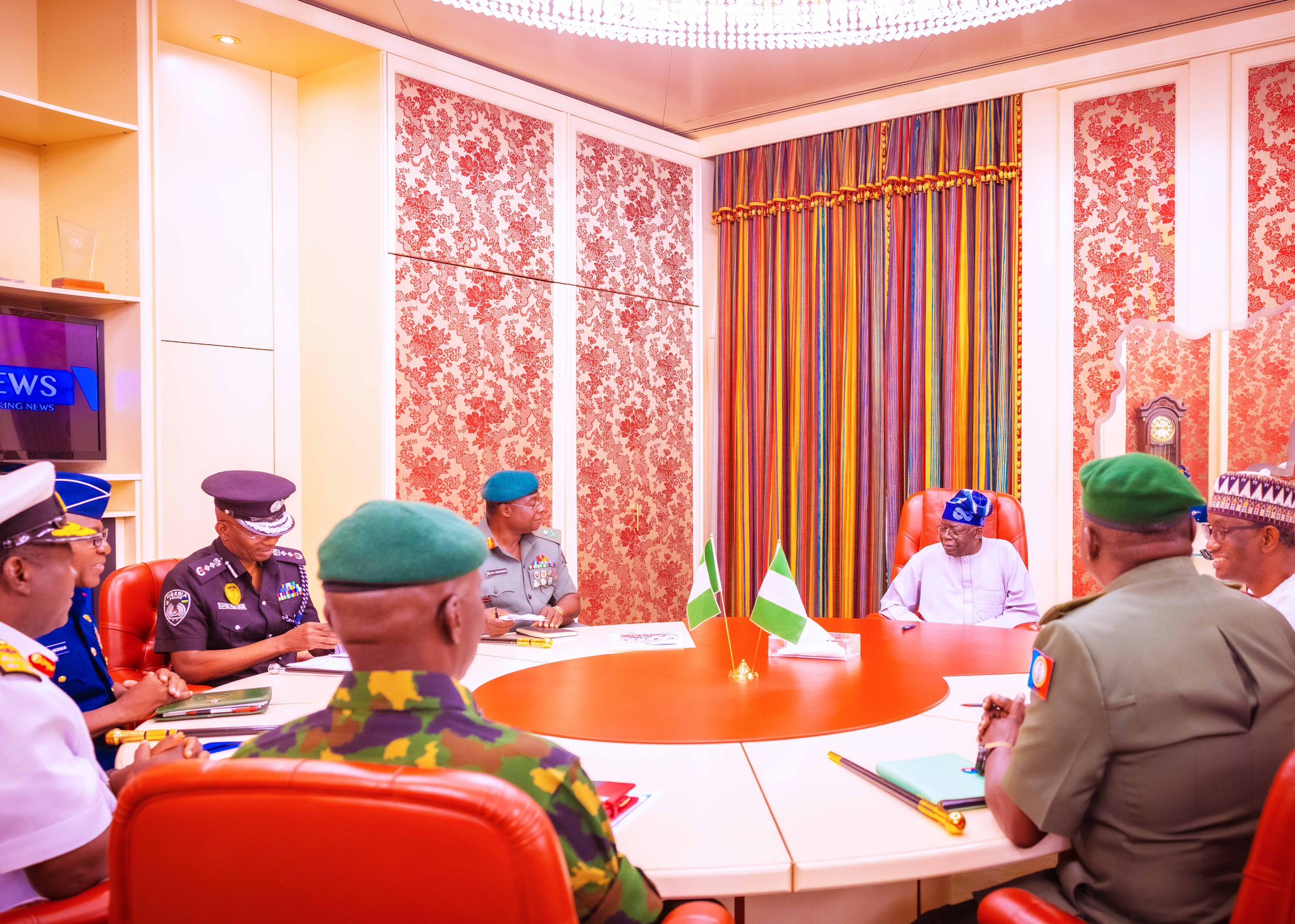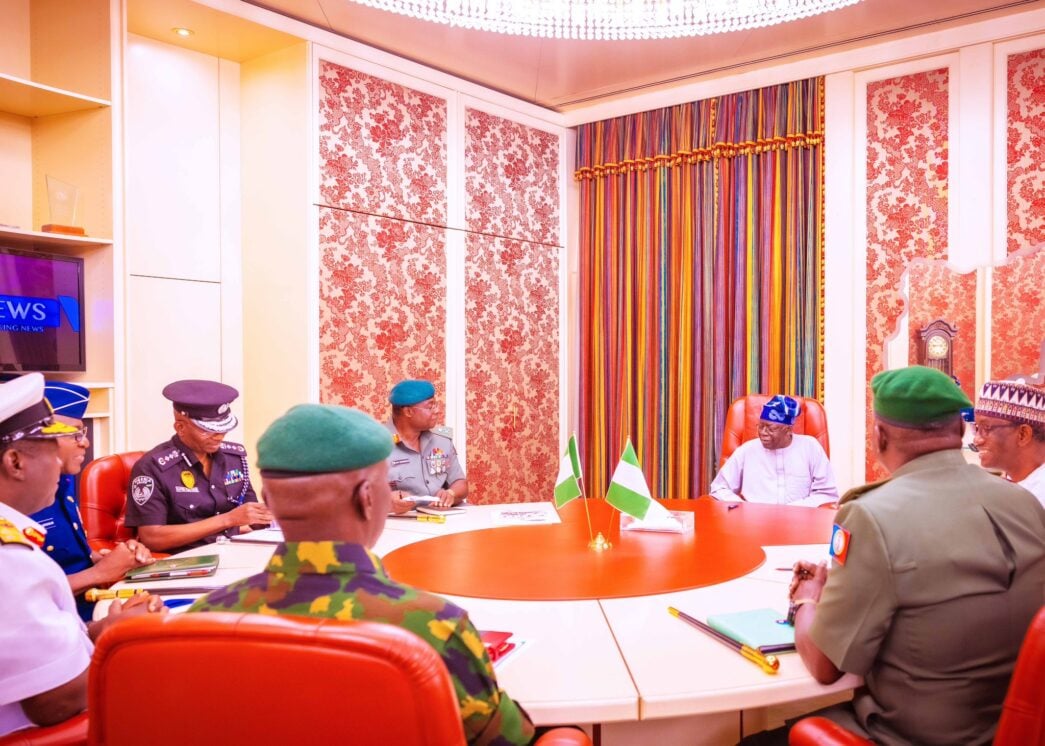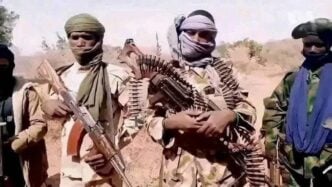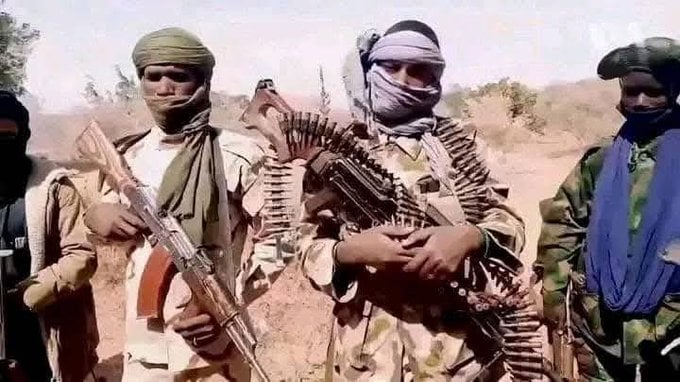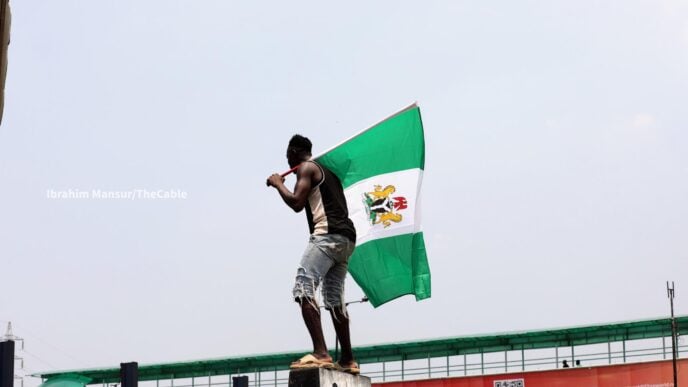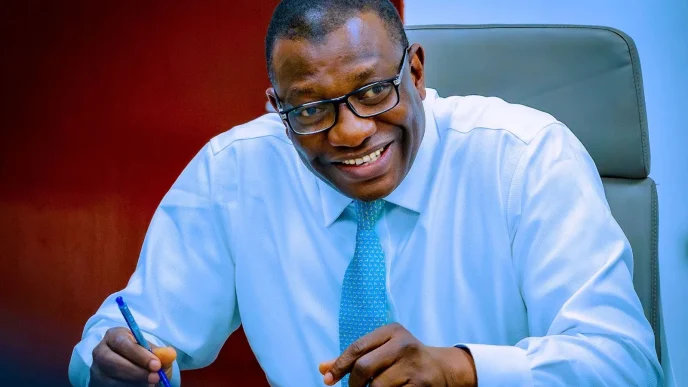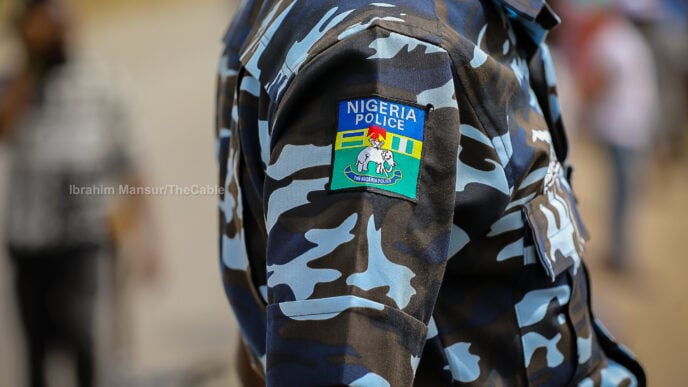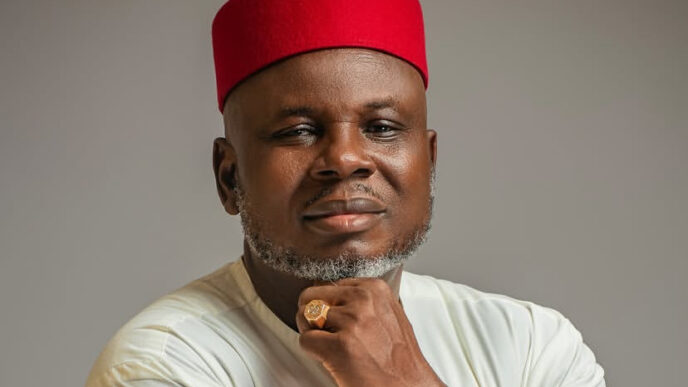File photo of service chiefs with President Tinubu
Last weekend was a sad one for Nigeria. From Bama in Borno State to Okpella in Edo State to Dandume in Katsina, there were killings of innocent citizens such that within the three days, about 80 people, including law enforcement officers, had been cut down by bandits, insurgents, and kidnappers.
The breakdown of the victims included over 60 people, among whom were seven soldiers killed in a night, house-to-house raid by insurgents in Darul Jamal, a resettled community in Bama LGA of Borno State. Over 20 houses and 10 buses were also razed in that bloody incident. In Okpella, eight officers of the National Security and Civil Defence Corps (NSCDC) and one civilian operative escorting five Chinese expatriates back to a cement factory were murdered. In contrast, one of the expatriates was kidnapped. Also, 13 passengers were reported to have been abducted on the Benin-Auchi road.
During that same period, armed bandits attacked the Magaji-Wanda community in Dandume LGA and killed seven people while abducting three residents. When the bandits were confronted in a shootout with local vigilantes, two of the latter group were felled in a hail of bullets while eight others sustained injuries. Last weekend, criminals took over those parts of our country and reigned supreme. Very sad.
Yet, the country is not in a war. The menace of insurgency, banditry, and kidnapping has proved to be a more deadly and costlier war to our country than any conventional war. It is a situation that gives the impression that Nigeria is experiencing a second civil war. And this was not the first time we have witnessed a bloodbath on the weekend.
Advertisement
With the above real-life scenario, it is my belief that the federal government should prioritize the issue of national security and the quelling of the fire of insurgency, banditry, and kidnapping over any other issue. Even the pursuit of economic policies should start taking a second place behind the fight against insecurity on the government’s priority list.
While I am not suggesting that the Tinubu administration has neglected the fight against insecurity, I believe the government needs to review its strategy, approach, and methods. It must make the fight against insecurity one of the mandatory deliverables of the administration.
The current strategy seems to be redundant and ineffective. The security challenge demands thinking out of the box. How come that a problem which was restricted to the North East and part of the North west in 2015 has now spread to almost all states in the North Central, South South, South east, and parts of South west? Where in Nigeria is safe from the war against human existence being waged by people believed to be mainly non-Nigerians? Stories of the menace of reckless killings, carefree kidnapping, and needless arson are now very common in the nation’s media and public spaces.
A huge section of the country has become a large killing field for these nihilists, sadists, and war mongers. As a result of the danger they now pose to society, farms across the country have been abandoned. Only a few daredevil people now venture to go to farms. Many local and diaspora investors in agriculture have beaten a retreat and cut their losses. The fear of criminals has contributed to food scarcity or what is now known as escalated food insecurity. Inflation is very high. Our markets are now populated by imported basic food items like beans, cassava, yams, and other staples which Nigerian farmers hitherto effortlessly grow, harvest, and sell to their compatriots.
Advertisement
The result is mass unemployment, rising poverty, other petty crimes, and a balance of trade that is skewed against Nigeria. In essence, the high level of insecurity is an antithesis to the economic thesis which the present government is espousing. That is why as the government reels out esoteric economic indices to buttress its claim that the Renewed Hope Agenda is yielding positive dividends, Nigerians groan that the figures have no positive impact on their daily existence. Life, the people say, is not getting better even if the economic statistics are looking sexier and healthier.
What then do I propose as an additional measure for tackling insecurity in the country? It is my view that the President needs to set up a joint-force, multi-disciplinary body to handle the periodic formulation and review of strategy on the fight against insecurity. The body should directly report to him every fortnight. This body should consist of the most brilliant individuals nominated by the various security agencies. The President should also do a background check to ensure that those nominated by the agencies got the slots on merit, not based on other considerations. The body should also include some of our IT specialists, security technology experts, and those whose specialty can help boost the war against terrorism with appropriate technology. This group should function as the President’s War Council. The members should help Tinubu formulate a broad strategy on how to eliminate this security crisis in the next 12 months.
Based on the strategy formulated by this war council, the President can set targets for his service chiefs and heads of all other security agencies. Failure to deliver on the targets leads to immediate and compulsory retirement.
The President, working through the Office of the National Security Adviser (ONSA), must initiate a comprehensive audit of the men, equipment, welfare, and sociological needs of the force. He must seek to block the wastages, replenish the diminished stock, boost sagging morale, and refocus the entire security system.
Advertisement
The Administration will therefore make it clear that it is ready to devote more time, resources, and attention to the issue of insecurity and that it desperately desires positive results. This means we must increase manpower in the defence, security, and law enforcement agencies to improve operational capacity and efficiency. This fight against insecurity must not be an endless race. There must be a terminal point and everybody involved must be forced to work towards achieving set goals. The operational rule should be: ‘deliver or be shipped out’.
The security agencies must as a matter of urgency take stock of all ungoverned, unutilised, fallow forest and land spaces in the Nigerian territory. A comprehensive programme should then be developed on how to manage those spaces. There is also a need to mandate the ONSA to develop a guiding code on inter-agency co-operation amongst the security services. There seems to be some gaps still existing in the way the war against insecurity is fought without the necessary collaboration between the security agencies. The various agencies still operate in silos.
The guiding code on inter-agency co-operation should be strictly adhered to and any infraction should be severely punished no matter, at what level it occurs.
The government should create an avenue for constant engagement between our country and its neighbours. This co-operation should take place on different fronts – security, diplomatic, economic, and political. Regional co-operation may help us to win the war against these cross-border terrorists.
Part of the assignment of the presidential task force earlier suggested is to develop a plan for constant sting operations within the financial system aimed at detecting sources of funding of the terrorists and how to block them. Laws and other regulatory rules in the financial sector must be reviewed as a way of detecting such pipes through which these funds are funneled around. There must be serious consequences for perpetrators of terrorism funding, no matter who they are and how innocent their operations appear.
Advertisement
There must be specialized courts to try terrorism charges. We may have to resort to special tribunals on the issue. There must be no delay in the trial and execution of the sentence. Severe measures like a death sentence which must be carried out, without delay and within a stipulated time, need to be introduced. The laws should be amended to punish lawyers, judges, and police or correctional officers (anybody within the legal system) who appear to be deliberately delaying the trial and execution of judgment on matters concerning terrorism.
The National Council of States should also mandate all state governors to engage with traditional rulers, community, and religious leaders on how to develop state, local government area, and community security plans or agendas for creating, maintaining, and sustaining peace. We also need to seek assistance from our development partners and other friendly, advanced countries on how we can quickly end this reign of terror in our country. International assistance, if strategically adopted and applied, can be useful to us at this critical point.
Advertisement
There is also the need to review the activities of the Ministry of Livestock Development since its creation and see whether it has justified the essence of its establishment. Has the initiative truly addressed the issues of itinerant herdsmen and their cattle such that they no longer have violent confrontations with farmers? Has the ministry also achieved the founding objective of nurturing the culture of running cattle ranches rather than taking cows on a migrant search for food? Also, has the ministry brought any change to the creation and sustenance of peace in our agrarian communities? Have the activities of the Ministry led to any improvement in the relationship between farmers and herdsmen?
In all, I hope some of the ideas articulated above will lead to more conversations on the issue of how best to tackle the security crisis in our country.
Advertisement
Olaniyonu writes from Abuja.
Advertisement
Views expressed by contributors are strictly personal and not of TheCable.

